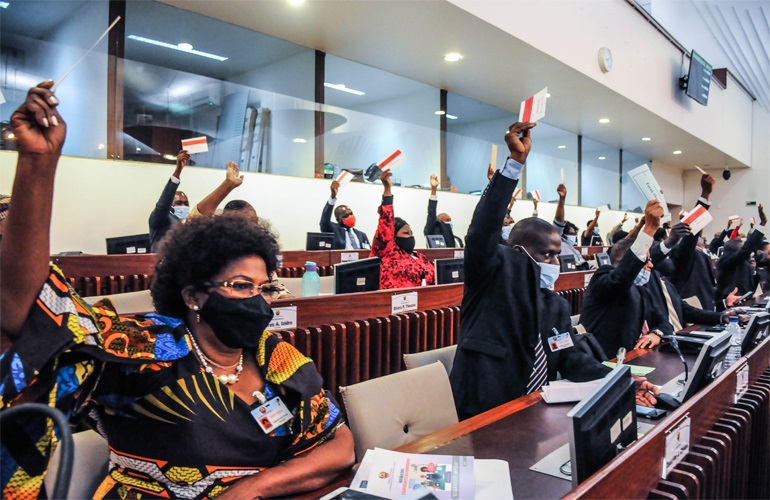Mozambique: Prosecution turns Mondlane's own words against him - AIM
Parliament: Most decisions and laws were passed by consensus in 2020; tends to be “closed to the citizens’ opinions” – IMD

FIlE - Parliament votes. [File photo: TVM]
Most of the decisions of the Mozambican parliament were consensual during the year 2020, the Institute for Multiparty Democracy (IMD) says, advising, however, that the deputies should listen more to citizens’ opinions and “interact”.
“Out of a total of 83 resolutions and 12 laws passed in 2020, 72 resolutions and nine laws were agreed [by consensus]. In percentage terms, these data correspond to 87% and 75%, respectively,” the IMD highlights.
The institution says that approval by consensus “values the commitment shown by all parliamentary benches to discuss matters of national interest stripped of party ties”.
The IMD, a civil society organisation focused on assisting democratic institutions in Mozambique, hopes that the parliamentary session which started on Thursday will translate into “dialogue” between the benches and between MPs and citizens in general.
“The Assembly of the Republic tends to become an institution closed to the opinion of the citizen,” notes IMD adding: “Parliament must interact with the citizen” .
IMD points out that a parliament is the main space for political debate and the deepening of democracy, which is why it is important for citizens to be involved in the decision-making process, in order to gather their sensitivity in relation to different policies.
The IMD’s analysis finds that “the Assembly of the Republic tends to become an institution closed to citizens’ opinions”, giving as an example the lack of public debate on subjects that aroused strong reactions in the last year, such as the election of civil society representatives to the National Elections Commission and the perks of deputies.
“Last year there were several reactions to the election of the members of the Ethics Council, in relation to the election of representatives of civil society in the National Elections Commission, and regarding the perks of deputies, among others, but there was no interest from deputies in deepening the citizen’s position or in providing clarification about their decisions,” the IMD analysis reads.
In 20020, ” despite the fact that deputies followed the public debate on certain matters on the parliamentary agenda, there was no interest [expressed on the part of parliament members] in considering them or in interacting with the citizen to deepen before [parliamentarians’] decision-making, a situation that the IMD would not like to see repeated.
Opening up to the outside is considered even more important this year because “debates on structuring instruments” for democracy are scheduled. These include the draft press, radio and TV broadcasting laws, the proposed amendment of the Civil Code, the revision of the Assembly of the Republic procedure rules and the draft revision of the law concerning the setting up of courts, among others.
“It is also important that parliament takes the reins of the debate on the management of the extractive sector sovereign wealth fund, in order to ensure that the law finally passed reflects the sensitivity of the different sectors of society,” it concludes.
The Mozambican Liberation Front (Frelimo), the ruling party, has a qualified majority of 184 of the 250 seats in the Assembly of the Republic. The Mozambican National Resistance (Renamo), the main opposition party, has 60, and the Democratic Movement of Mozambique (MDM), has six deputies in parliament.












Leave a Reply
Be the First to Comment!
You must be logged in to post a comment.
You must be logged in to post a comment.